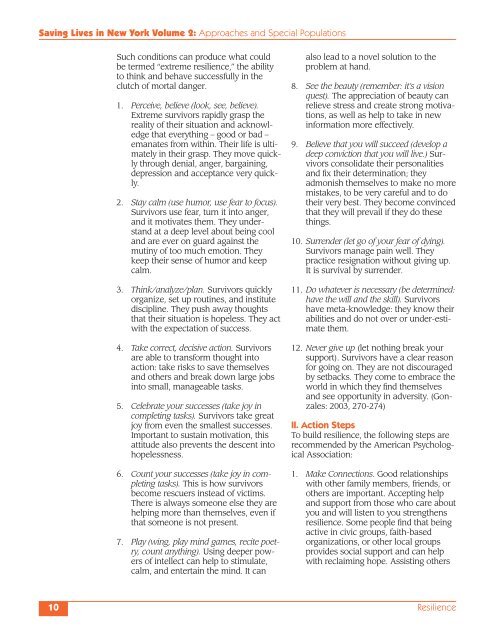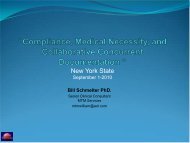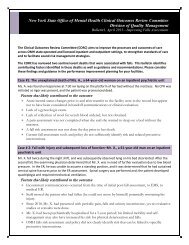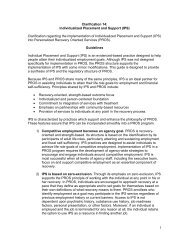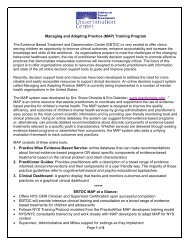Download - New York State Office of Mental Health
Download - New York State Office of Mental Health
Download - New York State Office of Mental Health
You also want an ePaper? Increase the reach of your titles
YUMPU automatically turns print PDFs into web optimized ePapers that Google loves.
Saving Lives in <strong>New</strong> <strong>York</strong> Volume 2: Approaches and Special Populations<br />
Such conditions can produce what could<br />
be termed “extreme resilience,” the ability<br />
to think and behave successfully in the<br />
clutch <strong>of</strong> mortal danger.<br />
1. Perceive, believe (look, see, believe).<br />
Extreme survivors rapidly grasp the<br />
reality <strong>of</strong> their situation and acknowledge<br />
that everything – good or bad –<br />
emanates from within. Their life is ultimately<br />
in their grasp. They move quickly<br />
through denial, anger, bargaining,<br />
depression and acceptance very quickly.<br />
2. Stay calm (use humor, use fear to focus).<br />
Survivors use fear, turn it into anger,<br />
and it motivates them. They understand<br />
at a deep level about being cool<br />
and are ever on guard against the<br />
mutiny <strong>of</strong> too much emotion. They<br />
keep their sense <strong>of</strong> humor and keep<br />
calm.<br />
3. Think/analyze/plan. Survivors quickly<br />
organize, set up routines, and institute<br />
discipline. They push away thoughts<br />
that their situation is hopeless. They act<br />
with the expectation <strong>of</strong> success.<br />
4. Take correct, decisive action. Survivors<br />
are able to transform thought into<br />
action: take risks to save themselves<br />
and others and break down large jobs<br />
into small, manageable tasks.<br />
5. Celebrate your successes (take joy in<br />
completing tasks). Survivors take great<br />
joy from even the smallest successes.<br />
Important to sustain motivation, this<br />
attitude also prevents the descent into<br />
hopelessness.<br />
6. Count your successes (take joy in completing<br />
tasks). This is how survivors<br />
become rescuers instead <strong>of</strong> victims.<br />
There is always someone else they are<br />
helping more than themselves, even if<br />
that someone is not present.<br />
7. Play (wing, play mind games, recite poetry,<br />
count anything). Using deeper powers<br />
<strong>of</strong> intellect can help to stimulate,<br />
calm, and entertain the mind. It can<br />
also lead to a novel solution to the<br />
problem at hand.<br />
8. See the beauty (remember: it’s a vision<br />
quest). The appreciation <strong>of</strong> beauty can<br />
relieve stress and create strong motivations,<br />
as well as help to take in new<br />
information more effectively.<br />
9. Believe that you will succeed (develop a<br />
deep conviction that you will live.) Survivors<br />
consolidate their personalities<br />
and fix their determination; they<br />
admonish themselves to make no more<br />
mistakes, to be very careful and to do<br />
their very best. They become convinced<br />
that they will prevail if they do these<br />
things.<br />
10. Surrender (let go <strong>of</strong> your fear <strong>of</strong> dying).<br />
Survivors manage pain well. They<br />
practice resignation without giving up.<br />
It is survival by surrender.<br />
11. Do whatever is necessary (be determined:<br />
have the will and the skill). Survivors<br />
have meta-knowledge: they know their<br />
abilities and do not over or under-estimate<br />
them.<br />
12. Never give up (let nothing break your<br />
support). Survivors have a clear reason<br />
for going on. They are not discouraged<br />
by setbacks. They come to embrace the<br />
world in which they find themselves<br />
and see opportunity in adversity. (Gonzales:<br />
2003, 270-274)<br />
II. Action Steps<br />
To build resilience, the following steps are<br />
recommended by the American Psychological<br />
Association:<br />
1. Make Connections. Good relationships<br />
with other family members, friends, or<br />
others are important. Accepting help<br />
and support from those who care about<br />
you and will listen to you strengthens<br />
resilience. Some people find that being<br />
active in civic groups, faith-based<br />
organizations, or other local groups<br />
provides social support and can help<br />
with reclaiming hope. Assisting others<br />
10 Resilience


